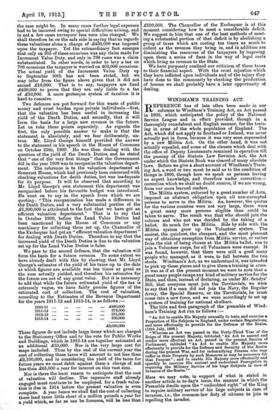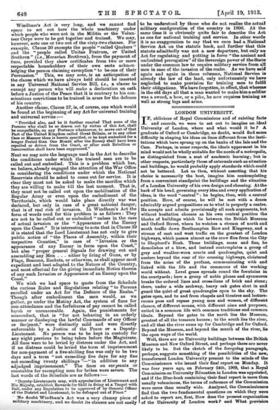WINDHAM'S TRAINING ACT. R EFERENCE has of late often been made
in our columns to Windham's Training Act, an Act passed in 1806, which anticipated the policy of the National Service League and in effect provided, though in a thoroughly roundabout and English manner, for the train- ing in arms of the whole population of England. The Act, which did not apply to Scotland or Ireland, was never actually put in force, because it was very soon superseded by a new Militia Act. On the other hand, it was not actually repealed, and some of the clauses which deal with the office of Deputy Lieutenants remained in operation till the passing of the Statute Law Revision Act, the Act under which the Statute Book was cleared of many obsolete laws. Before we give a short account of Windham's Train- ing Act, a word or two must be said as to the condition of things in 1806, though here we speak as persons having no expert knowledge, and therefore under correction— correction which we shall no doubt receive, if we are wrong, from our more learned readers.
The Militia system, enforced by a great number of Acts, imposed an abstract obligation upon all non-exempted persons to serve in the Militia. As, however, the quotas for the various counties were not very large, there were a great many more persons eligible than could be taken to serve. The result was that who should join the colours and who not was decided by the taking of a ballot. So much for the Militia. Side by side with the Militia system grew up the Volunteer system. The easiest, the quickest, the cheapest, and the most pleasant way of obtaining exemption from Militia service, or rather from the risk of being chosen at the Militia ballot, was to join a Volunteer corps, for all Volunteers were exempt. It was found, however, that there were still a good many people who managed, as it were, to fall between the two stools. Windham's Act, as we understand it, was intended to pick up these pieces and to give them a training in arms. It was as if at the present moment we were to note that a great many people escape any kind of military service for the State, and then, instead of declaring, as under Mr. Sandys' Bill, that everyone must join the Territorials, we were to say that if a man did not join the Navy, the Regular Army, the Special Reserve, or the Territorials, he must come into a new force, and we were accordingly to set up a system of training for national skulkers. The title and first paragraph of the preamble of Wind- ham's Training Act run as follows :- "An Act to enable His Majesty annually to train and exercise a Proportion of His Subjects in England, under certain Regulations, and more effectually to provide for the Defence of the Realm. (16th July, 1806.)
"Whereas an Act was passed in the Forty-Third Year of the Reign of His present Majesty, intituled, 'An Act to amend and render more effectual an Act, passed in the present Session of Parliament, intituled "An Act to enable His Majesty more effectually to provide for the Defence and Security of the Realm during the present War, and for indemnifying Persons who may suffer in their Property by such Measures as may be necessary for that Purpose " ; and to enable His Majesty more effectually and speedily to exercise His ancient and undoubted Prerogative in requiring the Military Service of his liege Subjects in case of Invasion of the Realm."
Here we may note, in support of what is stated in another article in to-day's issue, the manner in which the Preamble dwells upon the "undoubted right "of the King to require military service of his liege subjects in case of invasion, i.e., the common-law duty of citizens to join in repelling the invader. Wind ham's Act is very long, and we cannot find space to set out here the whole machinery under which people who were not in the Militia or the Volun- teer Corps were to be got together and trained. We may, however, note one or two out of the sixty-two clauses. For example, Clause 20 exempts the people "called Quakers and the "people called Unitas Fratrum, or United Brethren" (i.e., Moravian Brethren), from the payment of tines, provided they show certificates from two or more respectable householders of their own sects acknow- ledging the person claiming exemption" to be one of their Persuasion.' This, we may note, is an anticipation of the clause which we have always held should be inserted in any Universal National Service Bill, i.e., a clause to exempt any person who will make a declaration on oath before a Justice of the Peace that it is contrary to his con- scientious convictions to be trained in arms for the defence of his country.
Another clause, Clause 37, is, of course, one which would be found at the beginning of any Act for universal training and universal service
Provided also, and be it further enacted That none of the Persons who shall be so drawn out by virtue of this Act, shall be compellable, on any Pretence whatsoever, to serve out of that Part of the United Kingdom called Great Britain, or in any other Case or Manner than is herein specified. or be kept embodied for a longer Period than One Month after the Enemy shall have been repelled or driven from the Coast, or after such Rebellion or Insurrection shall have been suppressed."
Next we may note the language used in the Act to describe the conditions under which the trained men are to be called out and embodied. This is a problem which has, we believe, already engaged the attention of the War Office in considering the conditions under which the National Reservists should be asked to come out for service. It is clear they must not be asked to make the sacrifice which they are willing to make till the last moment. That is, they must not be called out upon the mobilization of the Regular Army or even upon the embodiment of the Territorials, which would take place directly war was declared, but only in case of a great national danger, that is of real risk of invasion. In Windham's Act the form of words used for this problem is as follows : They are not to be called out or embodied "unless in the case of actual invasion or the "Appearance of the Enemy upon the Coast." It is interesting to note that in Clause 39 it is stated that the Lord Lieutenant has not only to give public notice of "the Places of Assembly, within their respective Counties," in case of "Invasion or the appearance of any Enemy in force upon the Coast," but also "proper general Signals for drawing out and assembling any Men . . . either by firing of Guns, or by Flags, Beacons, Rockets, or otherwise, as shall appear most expedient and best adapted to the Nature of the Country, and most effectual for the giving immediate Notice therein of any such Invasion or Appearance of an Enemy upon the Coast."
We wish we had space to quote from the Schedule the curious Rules and Regulations relatino. "to Persons enrolled under an Act for the Defence of ° the Realm." Though after embodiment the men would, as we gather, go under the Mutiny Act, the system of fines for non-attendance and the forfeitures of pay cannot be called harsh or unreasonable. Again, the punishments for misconduct, that is "for not behaving in an orderly manner or disobeying the lawful Commands of any Officer or Serjeant," were distinctly mild and were directly enforceable by a Justice of the Peace or a Deputy- Lieutenant. No person was to be kept in custody for any night previous to being taken before the Magistrate. All fines were to be levied by distress under the Act, and if no distress could be levied the term of imprisonment for non-payment of a five-shilling fine was only to be two days and a term "not exceeding five days for any fine not exceeding twenty shillings "—" in addition to any adjudged imprisonment." The fines on serjeants or constables for exempting men for bribes were severe. The last words of the Schedule are as follows :- "Deputy-Lieutenants may, with approbation of Lieutenant and His Majesty, establish Rewards for Skill in firing at a Target with Ball, under any Regulation to be approved of by General Officer of the District and Lieutenant, to be defrayed out of Fines."
- No doubt Windham's Act was a very clumsy piece of military machinery, and no doubt its clauses are not easily
to be understood by those who do not realize the actual military configuration of the country in 180(3. At the same time it is obviously quite fair to describe the Act as one for national training and service. In other words it is no exaggeration to say that we once had a National Service Act on the statute book, and further that this statute admittedly was not a new departure, but only am Act for regulating and putting in force "the ancient and. undoubted prerogative" of the Sovereign power of the State under the common law to require military service from all men in case of the invasion of the realm. As we have said again and again in these columns, National Service is already the law of the land, only unfortunately we have neglected to make provision for training men to fulfil their obligations. We have forgotten, in effect, that whereas in the old days all that a man wanted to make him a soldier was a sword, a bow, or a pike, he now requires training as well as strong legs and arms.











































 Previous page
Previous page